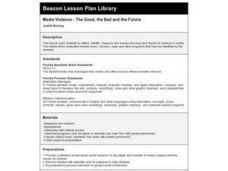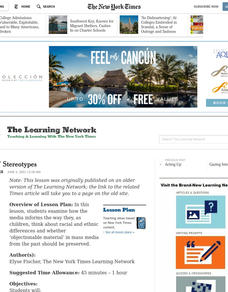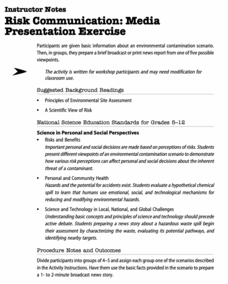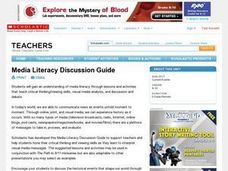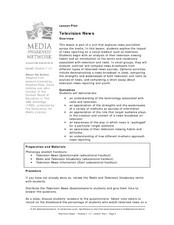Curated OER
Media Violence - The Good, the Bad and the Future
Third graders define, identify, measure, and assess the level and impact of violence in media. The media forms evaluated include music, sitcoms, news, and other programs that are identified and shared by the class.
Curated OER
Radio News
Part of a larger unit from the Media Awareness Network on media literacy, this particular lesson plan focuses on the medium of news radio. Small groups participate in discussions on their radio listening habits as well as the...
Social Media Toolbox
Social Media Messages
What are the elements of a good social media post? The 13th activity in the 16-part Social Media Toolbox incorporates all of the typical components found in a Facebook or Twitter post. Scholars work together to create great posts based...
News Literacy Project
News Goggles: Lionel Ramos, Oklahoma Watch
Given all the recent criticism of the news media and coverage, it's crucial that young people are given the tools they need to evaluate what they see, hear, and read about current events. A video interview from "News Goggles" introduces...
Curated OER
Sufferin' Stereotypes
Examine how the media informs the way your class thinks about racial and ethnic differences. Additionally, middle and high schoolers discuss whether "objectionable material" in mass media from the past should be preserved.
Curated OER
I Heard It 'Round the Internet: Sexual Health Education and Authenticating Online Information
Students evaluate websites regarding sexual health information. In this media awareness lesson, students discuss facts and myths regarding sex as they determine how to find reputable online and print resources.
Reporters Without Borders
2017 World Press Freedom Index
Freedom of the press was seen as a right so important that the Founding Fathers listed it as part of the first amendment to the United States Constitution. Americans pride themselves on this freedom, but just how free are American...
Curated OER
Who Knows? Your Privacy in the Information Age
Teach young adults how to become advocates for their privacy in the modern information age. In a series of five lessons, learners explore their beliefs and opinions about privacy vs. the actual laws regarding who has the right to access...
Curated OER
Risk Communication: Media Presentation Exercise
Students work in groups to prepare a brief broadcast or print news report from one of five possible viewpoints about an environmental contamination scenario. Students are given basic information about a chemical spill in a small town and...
Media Smarts
Unit Two: Celebrities and World Issues
Develop media smarts by considering the power of celebrity involvement in world issues. A look at the work of such celebrities as Angelina Jolie, Oprah, and Bono prepare learners to develop their own media campaign for a global...
Media Smarts
Learning Gender Stereotypes
How do media representations influence our attitudes? Examining advertisements through the filter of gender representation forms the basis of this, the second of three lessons that address gender stereotypes. Resources include links,...
Curated OER
Media Literacy Discussion Guide
Young scholars examine and analyze visual media and its messages critically. They determine whether specific media messages inform, entertain, or persuade and what factors influence the media. Using primary sources, they participate in...
Newseum
Are You a Publisher?: Free Press and You
What kinds of media do your pupils use to read and publish information? After a discussion about what publishing means, and about the freedom of the press, class members interview one or two other people about their publishing habits....
Newseum
E.S.C.A.P.E. Junk News
Fair, balanced, and reputable information? There's an acronym for that! Scholars learn the E.S.C.A.P.E. method for evaluating news sources. Then, pupils work in small groups to read and analyze a news story and discuss the activity to...
Curated OER
Cartoons for the Classroom: What's Replacing Our Newspapers?
What is happening to print media? Use this political cartoon analysis handout to facilitate pupil exploration of the online-media takeover and the decline of newspapers. Background information gives them context, and 3 talking points...
Curated OER
Stonewall and Beyond: Gay and Lesbian Issues
Help learners understand their own biases and how their perspectives may have been influenced by biased media sources. They keep a journal while viewing videos, exploring websites, and engaging in class discussions related to gay and...
Curated OER
Media Literacy Vocabulary Lesson
Students participate in an introductory lesson that focuses on communication. The two types of extrapersonal and interpersonal are covered. The lesson uses questions in order to guide the class discussion and writing responses.
Curated OER
Goldilocks and the Library Media Center
Third graders explore the library media center using the characters and story of "Goldilocks and the Three Bears" by James Marshall. They discuss what rules Goldilocks would need to follow in the library, complete a sequence chain for...
Facebook
Online Presence
What happens when an online post gets the wrong kind of attention? Learners evaluate the good, the bad, and the occasionally ugly side of social media posting with a instructional activity from a vast digital citizenship series. After...
Southern Poverty Law Center
Analyzing How Words Communicate Bias
Words are powerful ... can your class choose them wisely? Scholars evaluate news articles to discover the concepts of tone, charge, and bias during a media literacy instructional activity. The resource focuses on recognizing implicit...
News Literacy Project
News Goggles: Covering a Newsworthy Trial
The trial of Derek Chauvin, former Minneapolis police officer charged in the death of George Floyd, is the focus of a lesson that asks pupils to compare how local, nationial, and international news organizations reported the testimony of...
Teaching Tolerance
You Are the Product
What does it mean for a product or service to go viral? Scholars explore the topic by reading an article about the economics of social media. After reading, they complete a 3-2-1 data chart with information they learned from the text and...
Curated OER
Television News
Different media sources portray news in a variety of ways. In groups of three, learners look at different news sources, bringing in all the findings the next day. Three handouts help scholars compare sources, define specific terms used...
Nemours KidsHealth
Media Literacy and Health: Grades 6-8
Internet suffers could drown in the volume of information available on line. Here's an activity that can be a lifeline and buoy confidence in middle schoolers' ability to find reliable information and credible sources. After reading...


